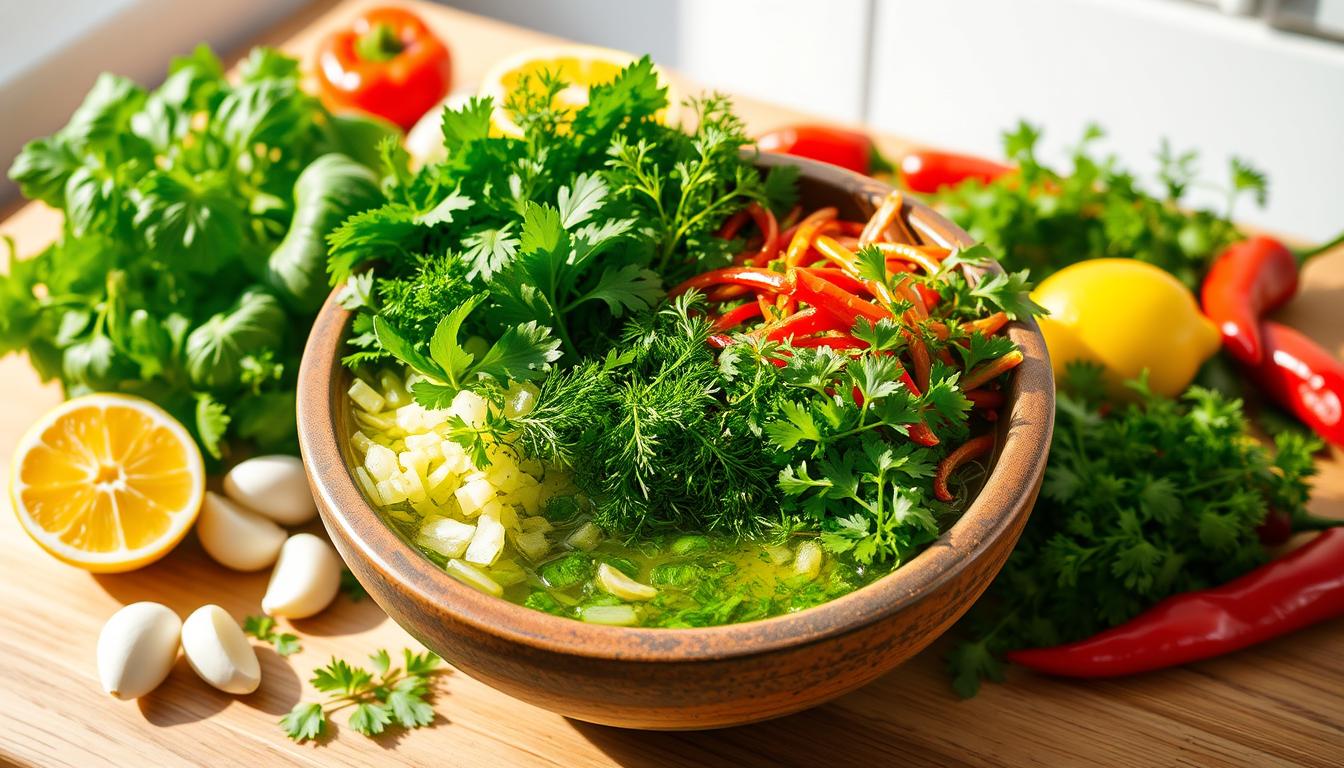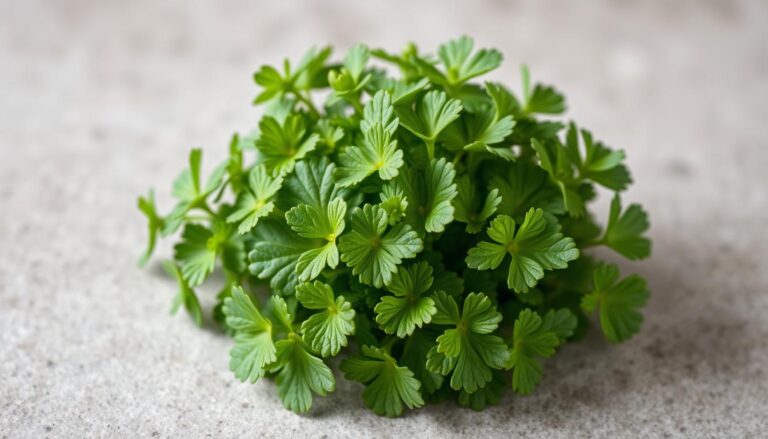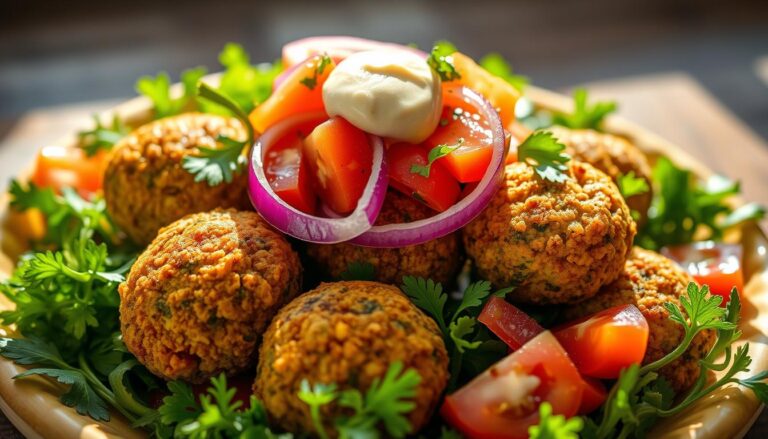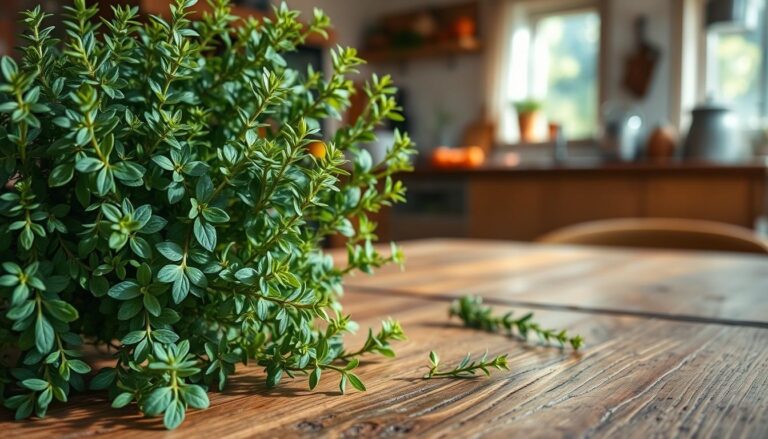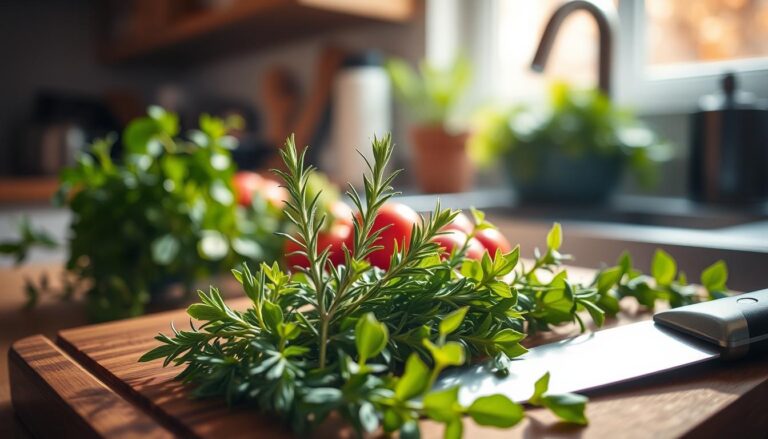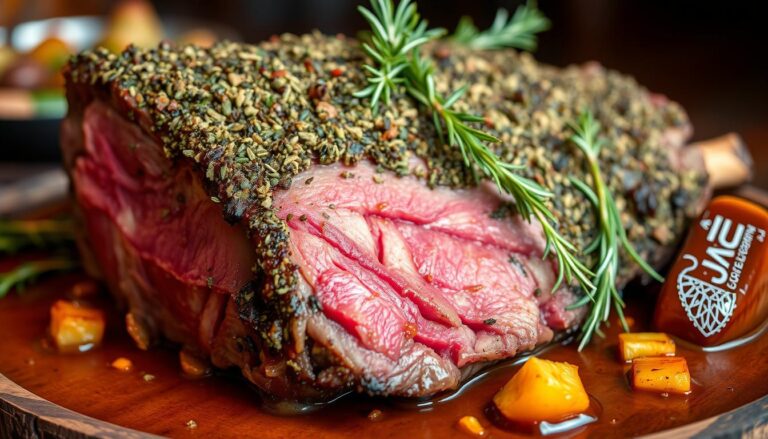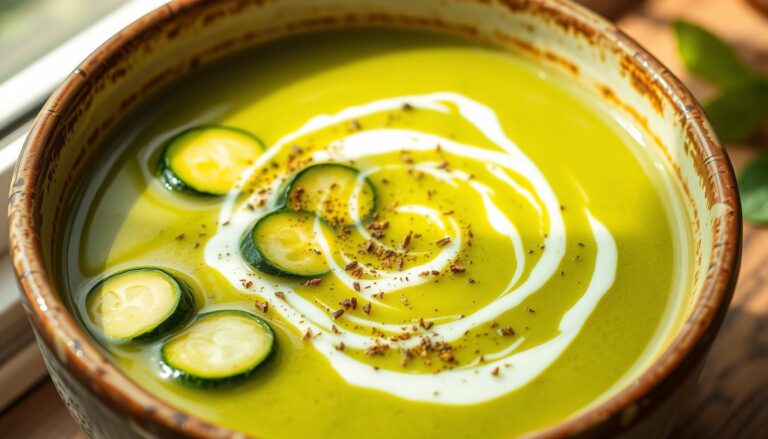Herb Sauce Recipes Elevate Your Meals with Flavor
What makes a great herb sauce? How can you make one that makes your meals taste better? A simple dressing like Lemon Herb Sauce Dressing with Mint, Cilantro, Lime, and Honey can do just that. It’s quick to make, brightens up salads or grilled dishes, and serves 8 with 123kcal per serving1.
Creating a tasty herb sauce is easy with a few ingredients. You’ll need fresh herbs, citrus juices, and honey. This is a great way to make your own herb sauce at home.
At home, you can try different ingredients to make a unique sauce. Use extra-virgin olive oil and red wine vinegar for a great flavor2. Making your own sauce is fun and rewarding. You get to choose what goes into it and how it tastes. You can even make a creamy sauce with sour cream and yogurt, making about 2 cups3.
Key Takeaways
- You can create a delicious and easy herb sauce recipe to add flavor to your meals with a few simple ingredients like fresh herbs, citrus juices, and honey.
- Making your own herb sauce at home allows you to control the ingredients and the flavor.
- You can experiment with different ingredients and flavors to create a unique and delicious sauce.
- A simple and flavorful dressing like the Lemon Herb Sauce Dressing with Mint, Cilantro, Lime juice, Lemon juice, and Honey can brighten up salads or grilled dishes.
- You can make a creamy herb sauce with sour cream, full-fat plain yogurt, and other ingredients, with a yield of approximately 2 cups3.
- You can use extra-virgin olive oil, red wine vinegar, and other ingredients to make a great herb sauce, with 75% extra-virgin olive oil, and 33% red wine vinegar2.
Understanding the Magic of Herb Sauces
Herb sauces can make your meals taste better. You can use them as a condiment, sauce, or marinade. A fresh herb sauce made with parsley and cilantro can add amazing flavor to any dish4.
With the right ingredients, you can make a fresh herb sauce. It adds flavor and excitement to any dish.
Some herb sauces can last up to 5 days in the fridge or be frozen for later4. You can make them with fresh herbs, acids, and oils. For example, a sauce with avocado, parsley, cilantro, jalapeno, garlic, lime, water, olive oil, salt, and pistachios is great as a dip, spread, or sauce5.
What Makes Herb Sauces Special
Herb sauces are versatile. They can be used in dishes like eggs, soups, and salads6. You can mix different ingredients like olive oil, rosemary, thyme, oregano, paprika, garlic, bay leaf, red pepper flakes, salt, and lemon juice6. You can also make them your own way.
Benefits of Making Your Own Herb Sauces
There are many benefits to making your own herb sauces. You can choose the ingredients and control the salt and sugar. You can also make them to your liking. Plus, it’s cost-effective and fun5.
| Herb Sauce | Ingredients | Prep Time | Cook Time |
|---|---|---|---|
| Fresh Herb Sauce | Avocado, parsley, cilantro, jalapeno, garlic, lime, water, olive oil, salt, pistachios | 5minutes | 5 minutes |
| Magic Sauce | Olive oil, rosemary, thyme, oregano, paprika, garlic, bay leaf, red pepper flakes, salt, lemon juice | 5 minutes | 5 minutes |
Essential Ingredients for Perfect Herb Sauce
To make a tasty herb sauce for pasta, you need fresh herbs, garlic, and lemon juice. A mix of fresh herbs, olive oil, lemon, garlic, red pepper flakes, and salt is key for a great sauce. You can use this quick herb sauce on grilled meats, chicken, and seafood7.
Choose leafy herbs like parsley, mint, cilantro, and basil for your sauce8. Olive oil makes the sauce smooth9. Add flavor with garlic and adjust the heat with red pepper flakes and lemon zest or juice7.
Here are the must-have ingredients for perfect herb sauce:
- Fresh herbs (parsley, mint, cilantro, basil)
- Garlic
- Lemon juice
- Olive oil
- Red pepper flakes
- Salt
Keep the herb sauce in the fridge for up to 1 week8. Try different herbs and ingredients to make your idealherb sauce for pastaorquick herb saucefor other dishes.
Remember to balance flavors by adjusting seasoning, acid content, and texture8. With these ingredients and tips, you’ll make a delicious and versatile herb sauce to enhance your meals.
Classic Fresh Herb Sauce Varieties
Herb sauce for chicken is a great way to add flavor to your meals. A creamy herb sauce can make your dishes richer and tangier. There are many classic fresh herb sauce varieties to try, each with its own taste.
These sauces are perfect for chicken or veggies. For instance, Chimichurri from Argentina is made with parsley, oregano, and more10. Chermoula from Morocco is a marinade for seafood, with cilantro and spices11.
A table summarizing some of these classic fresh herb sauce varieties is as follows:
| Sauce Variety | Origin | Ingredients |
|---|---|---|
| Chimichurri | Argentina | Parsley, oregano, onion, garlic, red-wine vinegar, red chile flakes |
| Chermoula | Morocco | Cilantro, parsley, mint, cumin, paprika, coriander, red chile flakes |
| Salsa Verde | Italy | Capers, anchovy fillets, lemon juice, zest |
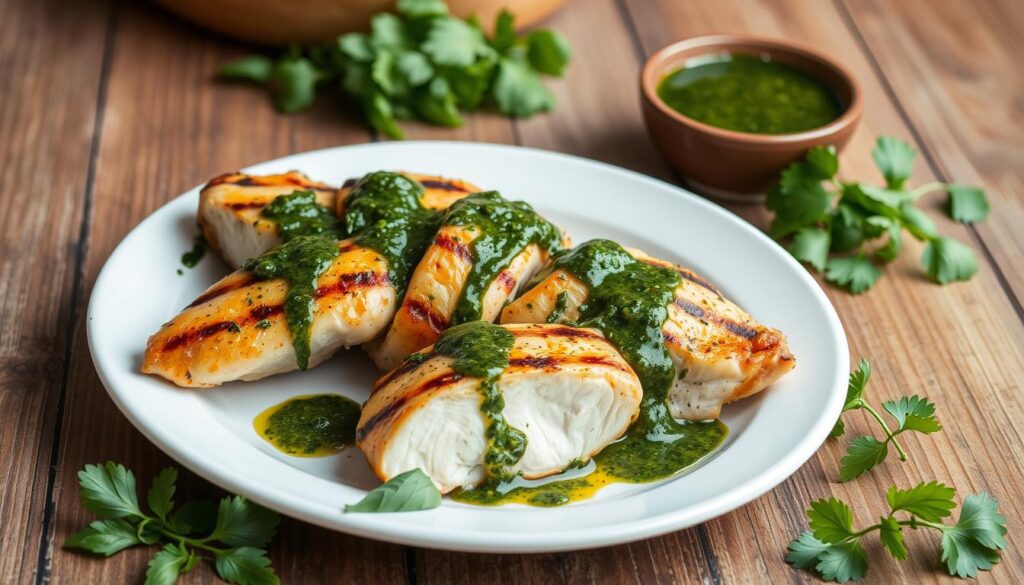
These classic herb sauces can make your chicken or veggies taste amazing. With the right ingredients and a bit of creativity, you can make your meals even better12.
Creating the Perfect Creamy Herb Sauce
To make a tasty homemade herb sauce, start with mayonnaise, which makes up about 50% of the sauce13. Mix it with herbs like basil, dill, parsley, and mint13. For a smooth texture, use a food processor, as suggested by the second source14. This source also offers a recipe for a green sauce with parsley, cilantro, and jalapeño.
A great herb sauce recipe balances flavors. Add a squeeze of lemon juice, about 1-2 tablespoons13, and a pinch of dijon mustard13. You can also add dried or fresh herbs. Scale up the ingredients to make more sauce14. Use 1 tablespoon of dried herbs or three times the quantity of fresh herbs14.
Here are some tips for making your own homemade herb sauce:
- Use high-quality ingredients, including fresh herbs and real mayonnaise.
- Don’t overprocess the sauce, as it can become too thin14.
- Let the sauce sit for at least 10 minutes before serving to allow the flavors to meld together13.
With these tips and a good easy herb sauce recipe, you can make a delicious and creamy sauce. The sauce has about 685 calories per cup, with 40g of carbohydrates, 12g of protein, and 54g of fat14. Try different herbs like dill, sage, or tarragon for different flavors. Each herb pairs well with specific foods like fish, poultry, beef, or pork14.
Quick and Easy Herb Sauce Recipes
A fresh herb sauce can really spice up your meals. With the right ingredients and a bit of creativity, you can whip up a tasty herb dressing. The garlic herb sauce recipe, for instance, can be ready in minutes. It’s great as a dressing or marinade15.
One of the best things about making your own herb sauce is you can tailor it to your liking. You can mix different herbs like parsley, basil, or cilantro. Add garlic, lemon juice, or olive oil for extra flavor. For example, the Lemon Herb Sauce Recipe makes 6 servings and has 114.1 calories per serving16. The green herb sauce recipe uses 3 garlic cloves, 1 cup of fresh parsley, and 1 cup of fresh basil or cilantro15.
Here are some quick and easy herb sauce recipes to try:
- Five-Minute Herb Sauce: Mix chopped herbs, garlic, lemon juice, and olive oil for a tasty sauce17.
- No-Cook Herb Sauce Options: Blend herbs, garlic, and lemon juice in a food processor for a quick sauce15.
- Make-Ahead Herb Sauce Recipes: Make a batch of herb sauce ahead of time. Store it in the fridge for up to 5 days17.
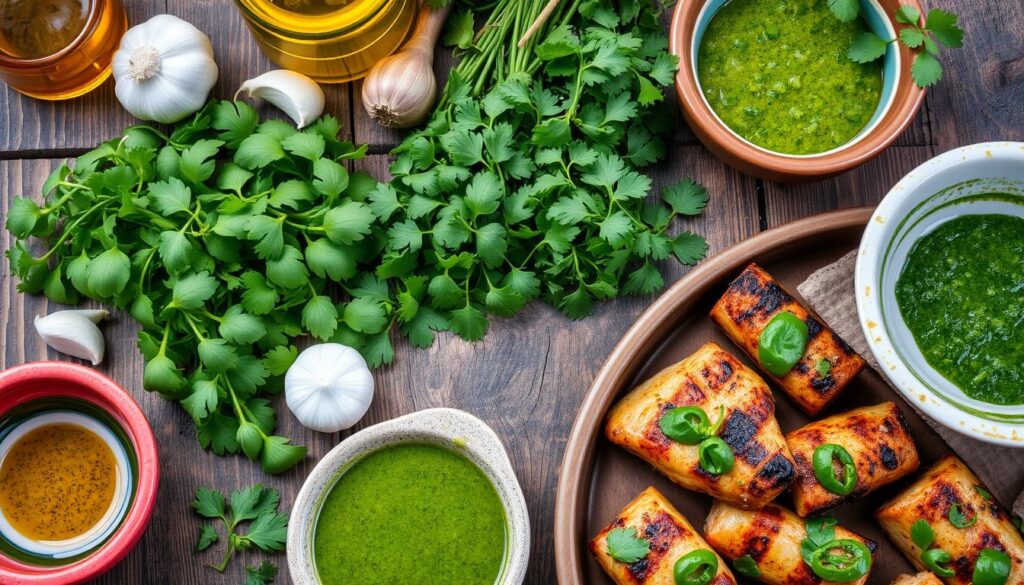
These quick and easy herb sauce recipes will add fresh flavor to your meals in no time. Whether you’re after a simple dressing or a more complex sauce, there’s a recipe for you. So, why not give it a try and see how a fresh herb sauce can transform your dishes16?
Pairing Your Herb Sauce with Different Dishes
There are countless ways to pair your herb sauce with various dishes. It’s perfect for adding flavor to pasta like spaghetti or linguine. Try it with grilled chicken or sautéed veggies for a tasty meal.
A herb sauce for pasta can include herbs like basil, parsley, or thyme. Add garlic, lemon juice, and olive oil for a tangy taste. For a quick sauce, mix herbs with sour cream or Greek yogurt.
Here are some tips for pairing your herb sauce with different dishes:
- Use a light and refreshing herb sauce, such as a lemon herb sauce, to pair with seafood or salads.
- Pair a rich and creamy herb sauce, such as a garlic and herb sauce, with pasta or meat dishes.
- Experiment with different combinations of herbs and spices to create unique and delicious flavor profiles.
According to18, add fresh herbs at the end of cooking to keep flavor. Exceptions include broiling fish or roasting veggies. Use19 to find the perfect pairing, like basil with apricots or oregano with pizza sauces.
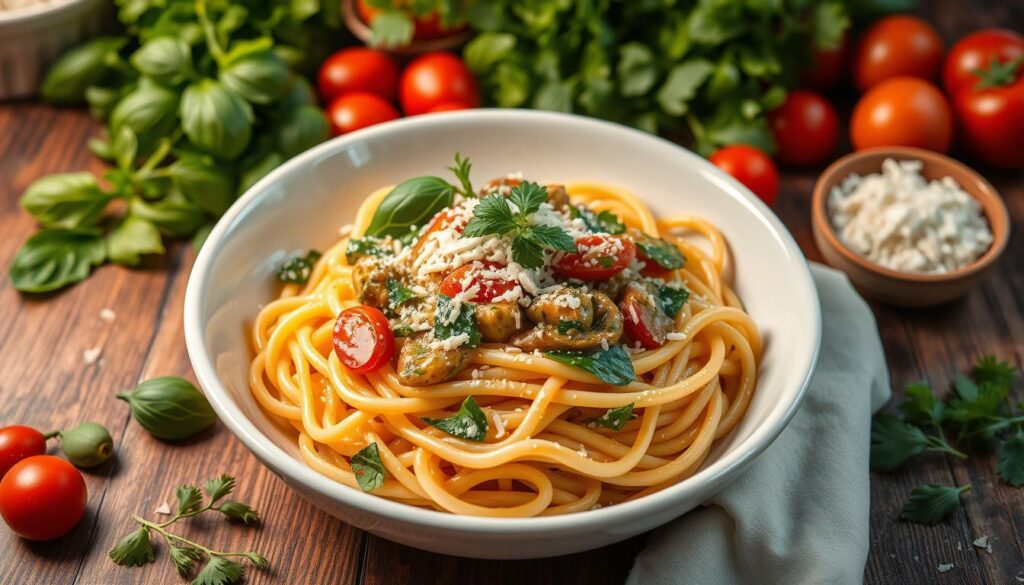
By following these tips and trying different herb sauce recipes, you can make many delicious dishes. Whether it’s a quick meal or a fancy dinner, a herb sauce for pasta adds flavor and excitement to your cooking.
Troubleshooting Common Herb Sauce Challenges
When making herb sauces, you might face some common problems. These can mess up the texture and taste of your sauce. To get the perfect herb sauce for chicken, it’s key to solve these issues. For example, if your sauce is too thick, slowly add liquid while whisking until it’s right20. If it’s too thin, simmer it to reduce the liquid, or use a slurry of cornstarch or flour20.
To get a smooth and creamy herb sauce, use a food processor. Add ingredients in the right order21. This ensures a consistent texture and avoids lumps. Also, using top-notch ingredients and seasoning slowly can make your herb sauce for chicken rich and flavorful20.
Some common problems with herb sauces include lumps, broken sauces, and bland flavors. To avoid lumps, add liquid slowly while whisking20. For broken sauces, warm water or egg yolk can fix them20. To make bland sauces better, use quality ingredients, season slowly, and add umami boosters20.
By using these tips and solving common problems, you can make a tasty and creamy herb sauce. This sauce can enhance your meals and add flavor to various dishes. Whether for chicken, pasta, or veggies, the right methods and ingredients are crucial21.
Storing and Preserving Your Homemade Herb Sauces
Storing your homemade herb sauces right is key to keeping their taste and quality. You can keep them in an airtight container in the fridge for up to 5 days. For longer storage, freeze them in ice cube trays or small containers. This makes them easy to add to different dishes22.
To freeze your sauce, just pour it into an ice cube tray or small container. Then, put it in the freezer. Once it’s frozen, move the cubes to a freezer-safe bag or container for later22. This way is handy and helps avoid waste. You can also dry your herbs and keep them in airtight containers. This lets you use them in your easy herb sauce recipe all year23.
Here are some tips for storing and preserving your homemade herb sauces:
- Store your herb sauce in an airtight container in the refrigerator for up to 5 days.
- Freeze your herb sauce in ice cube trays or small containers for longer storage22.
- Dry your herbs and store them in airtight containers for later use23.
Conclusion: Mastering the Art of Herb Sauce Making
Mastering herb sauce making can make your meals more exciting with fresh flavors24. You can try classic French sauces, Mediterranean blends, or create your own. The choices are endless when you make your own herb sauces25.
High-quality ingredients and balanced flavors are key to great herb sauces25. Feel free to mix herbs, adjust seasonings, and find the right consistency26. With practice, you’ll impress everyone with your sauce skills.
Start by gathering fresh herbs and a whisk for a flavorful journey26. Make your meals better, try new tastes, and enjoy making your own herb sauces. Your taste buds will thank you.
FAQ
What are the benefits of making your own herb sauces?
Making your own herb sauces lets you pick the ingredients and flavors. This way, you get a fresh taste that’s just right for you. Plus, homemade sauces are often cheaper and healthier than store-bought ones.
What are the essential ingredients needed to make the perfect herb sauce?
To make great herb sauces, you need fresh herbs, garlic, citrus juices, and oils. Choosing the right mix of these ingredients is crucial for a tasty and balanced sauce.
What are some classic varieties of fresh herb sauces?
Classic herb sauces include Italian green sauce, French herb sauce, and Mediterranean blends. These add flavor to pasta, chicken, and veggies.
How can I make a quick and easy herb sauce at home?
There are quick ways to make herb sauces at home. Try five-minute sauces, no-cook recipes, or make-ahead options. They’re perfect for adding flavor with little effort.
How can I troubleshoot common issues when making herb sauces?
Common problems with herb sauces are getting the right consistency and flavor. Adjusting ingredients, seasoning, and blending can fix issues like too thick or thin sauces, or unbalanced flavors.
How should I store and preserve my homemade herb sauces?
Storing and preserving homemade herb sauces is key to keeping their taste and quality. Follow guidelines for refrigeration, freezing, and watch for spoilage signs. This way, your sauces stay fresh and tasty.

